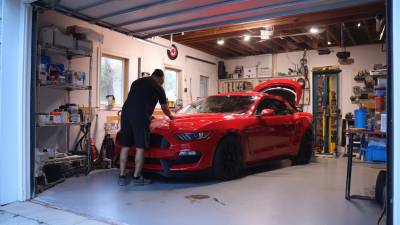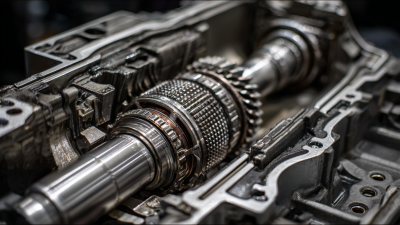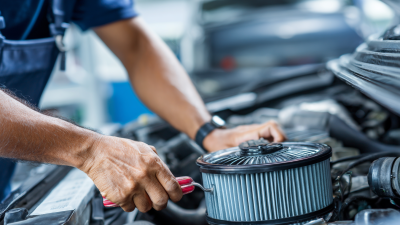Auto Repair Shop In Plainfield, IL
Revolutionizing Your Skills: The Ultimate Guide to Auto Repair Programs for Beginners
In an era where automobiles are an integral part of daily life, the demand for skilled automotive technicians is surging. According to the Bureau of Labor Statistics, employment of automotive service technicians and mechanics is projected to grow 4 percent from 2019 to 2029, which translates to an increase of approximately 35,000 jobs in the field. As vehicles become more sophisticated, the necessity for trained professionals is paramount. This is where auto repair programs come into play, offering beginners the essential skills and knowledge needed to thrive in the industry. These programs not only cover fundamental repairs but also delve into advanced technologies and techniques, equipping aspiring mechanics with the tools to succeed in a competitive market. By engaging with comprehensive auto repair programs, students are well-prepared to meet the evolving challenges of automotive maintenance and repair, setting a solid foundation for a rewarding career.

Understanding the Basics: Key Concepts Every Auto Repair Beginner Should Know
Understanding the basics of auto repair is crucial for beginners looking to enhance their skills in this field. According to the Bureau of Labor Statistics, the employment of automotive service technicians and mechanics is projected to grow by 4% from 2019 to 2029, indicating a steady demand for trained professionals. This growth highlights the importance of learning key concepts early in one’s career. Beginners should familiarize themselves with basic automotive systems, such as engines, transmissions, brakes, and electrical systems. Knowledge of these components enables aspiring mechanics to diagnose and repair vehicles effectively.
Moreover, comprehending the terminology and tools associated with auto repair is essential. A report by the National Institute for Automotive Service Excellence (ASE) suggests that a strong foundation in automotive technology can significantly improve job performance and customer satisfaction. For instance, understanding diagnostic tools like OBD-II scanners can aid in precise problem identification, facilitating efficient repairs. As beginners delve into auto repair programs, grasping these fundamental concepts will not only enhance their technical skills but also prepare them for the challenges of the automotive industry.
Essential Tools: What You Need to Start Your Auto Repair Journey
To embark on your auto repair journey, having the right tools is essential. Beginners should start with a basic toolkit that includes items such as a socket set, wrenches, screwdrivers, pliers, and a hammer. A good-quality jack and jack stands are crucial for safely lifting your vehicle while performing repairs or inspections. Additionally, an oil filter wrench and a drain pan are important for tasks like oil changes, which are foundational skills in auto maintenance.
In addition to hand tools, investing in a few diagnostic tools can significantly aid your learning process. A multimeter is invaluable for electrical troubleshooting, while an OBD-II scanner will help you read and clear error codes from your vehicle’s computer system. As you progress, consider adding specialty tools tailored to specific repairs, such as a torque wrench for precise tightening of bolts. Acquiring these essential tools will not only enhance your skills but also instill confidence as you take on various auto repair projects.

Hands-On Learning: Enrolling in Auto Repair Classes and Workshops
Enrolling in auto repair classes and workshops is a crucial step for beginners aiming to gain practical skills in the automotive field. These hands-on learning experiences not only provide foundational knowledge about vehicle mechanics but also immerse students in an environment where they can apply what they've learned in real-time. By participating in workshops, individuals can work directly on various components of automobiles under the guidance of experienced instructors, which enhances their understanding of intricate systems like engines, brakes, and electrical wiring.
Additionally, auto repair classes often include a mix of theoretical and practical components, ensuring that learners are well-equipped for both diagnostic and repair tasks. Many programs offer access to specialized tools and equipment, allowing students to familiarize themselves with the tools of the trade. Engaging in group projects and troubleshooting exercises also fosters teamwork and communication skills, which are essential in any repair shop setting. With the automotive industry continuously evolving, these classes provide a solid foundation that prepares beginners for further advancement in their careers or personal pursuits in auto repair.
Common Repairs Made Easy: Step-by-Step Guides for Beginners
When it comes to auto repair, beginners can often feel overwhelmed by the myriad of tasks that need to be tackled. However, with step-by-step guides simplifying common repairs, aspiring mechanics can take charge without needing extensive prior knowledge. Recent reports have shown that DIY car repairs can save average car owners up to $1,200 annually. Tasks like changing brake pads or replacing a battery can comfortably be managed at home with just a few essential tools, which is both economical and empowering.
For those starting their journey into auto repair, it's crucial to focus on the most common issues. For instance, replacing your car's brakes doesn’t have to be an expensive ordeal; guides indicate that understanding how to inspect and replace brake pads can lower repair costs significantly. Similarly, other routine fixes such as replacing air filters or changing engine oil are easily manageable. Home repair guides suggest that even novice DIYers can tackle these jobs with confidence. This hands-on approach not only increases your skills but also enhances the overall longevity and performance of your vehicle.
Finding Resources: Online Platforms and Communities for Auto Repair Enthusiasts
In today's digital age, aspiring auto repair enthusiasts have unprecedented access to a plethora of online resources and communities designed to enhance their skills and knowledge.
Platforms such as YouTube offer a treasure trove of instructional videos covering everything from basic maintenance to complex repairs.
This visual guidance allows beginners to learn at their own pace and gain confidence in their abilities.
Websites like Reddit host vibrant communities where users share experiences, seek advice, and post questions to more experienced mechanics.
Engaging in discussions on these platforms can provide valuable insights and tips not found in traditional classroom settings.
Additionally, dedicated online courses are another effective way to gain structured knowledge in auto repair.
Websites offering platforms like Coursera and Udemy provide comprehensive courses that cover foundational concepts, safety protocols, and hands-on techniques.
These courses often include interactive components, such as quizzes and forums, fostering a sense of community among learners.
Joining online forums or Facebook groups focused on auto repair can also enhance the learning experience, allowing you to network with like-minded individuals and share resources, trade tips, and celebrate each other’s successes.

Related Posts
Contact Us
Service Area
Plainfield, 60585, 60544, 60586, Naperville, 60564, Bolingbrook, 60490, 60440, Romeoville, 60446, Will, Kendall, DuPage, Counties. Our auto repair shop in Plainfield, IL, has been serving the local area plus all surrounding Chicagoland since 1978.
Specialties
• Computer Diagnostic • Brake Shop • Engine Replacement • Transmission Rebuild • Clutch Replacement • Differential Rebuild • Suspension Shop • Steering • Shocks & Struts • Heating & Cooling • Electrical • Exhaust Shop • Catalytic Converter Replacement • Alignment • Domestic & Foreign Vehicle Service • Auto Repair In Plainfield, IL • Auto Repair Shops Near Me • Towing Service Near Me





